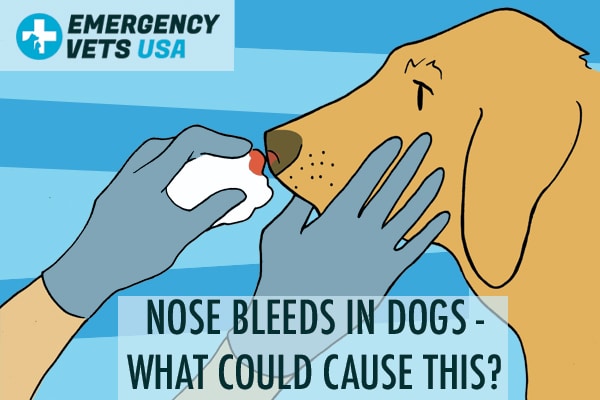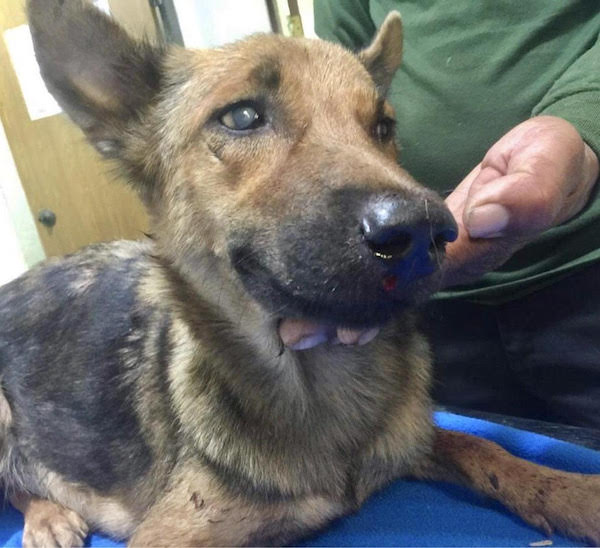Nose Bleeds In Dogs – What Could Cause This?
Many humans have gotten a nosebleed at some point throughout their lives.
We can usually chalk our nosebleeds up to a recent injury or a dry nose, but a dog with a nose bleed can have us scratching our head.
Nose bleeds are not as common in our canine friends as they are in humans.
Nosebleeds rarely occur in dogs without significant cause, ranging from sudden trauma or nasal tumors.
So what could cause a nose bleed in your canine friend?
In this article we will talk about what can cause them and what you need to do to stop them.

What Is Epistaxis In Dogs?
Epistaxis is a term used to describe bleeding from the nasal cavity or nostrils in our canine friends.
More commonly referred to as a nosebleed, epistaxis is often a sudden occurrence in an otherwise healthy pup.
Not only can a nosebleed catch a pet owner off guard, but your pup may paw at their nose in confusion as well.
Nosebleeds are not a normal occurrence in our pups, and should always warrant attention on our part.
Are Nosebleeds Serious In Dogs?
Not all nosebleeds in dogs are due to a major medical concern, but they should be taken seriously just in case.
Unless you witness a trauma in the moments leading up to your dog’s nosebleed, it’s impossible to rule out any critical conditions that could lead to this sudden epistaxis.
Due to the risk of underlying medical complications, we suggest contacting your vet anytime you notice a sudden nosebleed in your pup.
Symptoms Of A Nosebleed In Dogs
While the presence of blood around your dog’s nasal cavity is the most obvious symptom of a nosebleed, there are some other signs to be aware of as well.
Sometimes we catch our dogs after their nosebleed has occurred, making it important to be aware of the other potential clues.
Some of the most common signs of a nosebleed in dogs include:
- Drips or continuous flow of blood coming from your dog’s nasal cavity or nostrils
- Dry or crusted blood around your dog’s nostrils
- Swelling around your dog’s nose
- Pawing at the face or nose
- Vomit that is often dark in color or bloody
- Noticeable trauma around the nose
- Drops of blood found around your home
If you notice any of the above symptoms in your canine companion, we suggest reaching out to your vet for further advice.
This is especially true if the nosebleed does not resolve within 10-15 minutes of applying first aid, as this can be a sign of an underlying medical cause.
First Aid For A Nosebleed In Dogs

We always suggest reaching out to your veterinarian if your dog has a sudden nosebleed, but there are a few things you can do at home to offer your pup first aid.
This should not replace veterinary care to get to the bottom of their symptoms, but it can help to stop the bleeding in that moment.
Some basic first aid to stop your dog’s nosebleed includes:
- Briefly assess the situation for any evidence of injury or specific trauma. This will help you when it’s time to explain the potential cause of your dog’s nosebleed.
- Try to keep your pup as calm as possible. The more worked up your dog is, the longer their nosebleed will continue.
- If your dog will allow it, you can attempt to place an icepack on your dog’s nose to slow the bleeding. The ice will help to constrict the blood vessels in the area, hopefully ending the nosebleed altogether.
- Make sure your dog is not having any difficulty breathing. Nosebleeds can flow into their throat when excessive, and some toxicities can lead to bleeding in the chest as well.
- Once you have the situation under control, it’s time to give your vet a call to see if they would like your pup to come into their office.
No matter what you see online, it’s important to refrain from pouring anything into your dog’s nose or offering them any oral medication.
These options can lead to severe complications for our canine friends, ranging from breathing difficulties to organ failure.
No matter how tempting it is to offer your pup further aid, it should never go further than the steps we listed above.
When Should You Take Your Dog To The Vet For A Nosebleed?
Unless your veterinarian says otherwise, we always suggest having your dog seen for a nosebleed.
Even if a nosebleed develops after a sudden injury, there is no way to rule out further complications without an exam from a veterinarian.
Nosebleeds can point to serious underlying illness, so we always recommend having your pup seen to be safe.
What Could Cause A Nosebleed In Dogs?
There are many potential causes of epistaxis in our canine friends.
While some nose bleeds can point to minor issues with an easy solution, other causes are a bit more involved.
To help you better understand the many potential causes your vet will be ruling out, let’s list some of the most common factors behind canine nosebleeds below.
Trauma
Trauma to the face or nose can easily cause a dog’s nose to bleed.
Just like in humans, a sudden blow to the facial area can cause their nose to bleed in ranging severity.
They may also experience bleeding in the mouth, swelling of the face, and even abrasions of the face.
Inflammation
Inflammation of the nasal passages can cause nosebleeds in some furry friends. Inflammation of these passages can develop due to canine allergies, respiratory illness, dental infections, and localized infections.
Nasal Tumors
Nasal tumors are a common cause of nosebleeds in our furry friends.
Not only can nasal tumors bleed unprovoked, but they can begin to bleed if the nose is injured or bumped in any way.
Dental Disease
Severe dental disease can cause many strange symptoms in dogs, nosebleeds being one of them.
Dental abscesses in the upper portion of the mouth can invade the nasal passages in some cases, leading to inflammation within the nose.
Not only can this inflammation itself cause a nosebleed, but this can also occur if an abscess ruptures.
Tick Disease
Tick disease in dogs, specifically anaplasma, can lead to nosebleeds in some cases.
Tick diseases can decrease circulating platelets, which are responsible for the blood’s ability to clot with injury.
Not only can tick disease cause nosebleeds due to this, but it can lead to severe bruising and petechiae.
Clotting Disorders
Similar to tick disease in dogs, clotting disorders can also lead to nosebleeds.
Clotting disorders can be autoimmune related or toxicity related, but the result is no different.
Toxicities
Toxicities, like rat bait ingestion, can impact a dog’s ability to clot properly.
Some toxicities that impact clotting can lead to nosebleeds, bloody diarrhea, bloody vomit, bloody urine, and even coughing up blood.
The possibilities listed above are some of the most common culprits behind nosebleeds in dogs, but there are other potential causes on the list as well.
Other potential factors to be aware of include autoimmune diseases, bone marrow disease, cancer, and even drug interactions.
The possibilities are vast, which is why your veterinarian may perform multiple diagnostics to get to the bottom of your dog’s nosebleed.
Diagnosing The Cause Of Nosebleeds In Dogs
As you can see, there are a list of potential causes of nosebleeds in our canine companions.
This is why your vet may be inclined to perform multiple diagnostics when this symptom is present, especially if there is not a known trauma in the picture.
To help you better understand what to expect at your vet’s office, let’s list some of the diagnostics that your vet may recommend.
- Oral exam: An oral exam will help your vet rule out any dental abscesses or foreign bodies within the mouth, as well as oral cancer.
- CBC & chemistry: A CBC will determine your dog’s platelet count, RBC count, and WBC count. These values can help them determine if they need to explore any of these values further.
- 4DX snap test: A 4DX combo will test your dog for anaplasma, ehrlichia, lyme disease, and heartworms.
- Clotting tests: Coagulation tests can search for any clotting abnormalities in your pup, which can point your vet in a better direction if these values are abnormal.
- Nasal swab: If your vet is suspicious of a current infection in your dog’s nasal cavity, they can swab the nose and send it out for a culture.
- Blood pressure test: A blood pressure test may be performed in some furry friends, as high blood pressure can lead to nosebleeds in some cases.
- X-rays: X-rays can be performed to rule out any bleeding in the lungs, trauma to the skull, and even trauma to the nasal cavity.
Your veterinarian will recommend the best diagnostic options for your dog’s specific history.
Your vet knows your dog’s situation, so we always suggest following their guidance if your pup has a nosebleed.
Treatment For Nosebleeds In Dogs
The treatment for your dog’s nose bleed will vary greatly based on the cause behind their symptoms.
Some dogs will recover with an ice pack to the nose until it stops bleeding, while others will need intensive care in a veterinary hospital.
The best way to understand your dog’s treatment plan is by asking your veterinarian what to expect going forward.
Some of the best questions to ask to better understand your vet’s recommended treatment includes:
- What is my dog’s diagnosis?
- What treatment is needed to cure my dog?
- Will my dog need to be hospitalized?
- What is the standard prognosis for their condition?
- How long will their recovery be?
- Will I need to continue any care or medication at home?
By asking these questions, you can paint a clear picture of what’s needed going forward.
Prognosis Of Nosebleeds In Dogs
The best way to understand your dog’s prognosis is by communicating with your veterinarian.
In many cases involving nosebleeds, a dog that receives proper medical care in a timely manner will go on to make a full recovery.
This can be a bit more complicated based on how severe their underlying illness is, so a conversation with your vet can offer the most accurate prognosis for your pup.
Final Thoughts
Nosebleeds in dogs can be startling for most pet owners. The list of potential causes for this symptom is long, so there is no better way to solve this issue than a trip to your vet.

My name is Amber. I am a dedicated animal lover that turned my passion into my career. I am a Licensed Vet Tech with 12 years of experience in veterinary medicine, but I recently took my career online to help spread accurate information on animal care. With how vast the online world is, I have a strong desire to ensure that the reader always walks away with helpful pet advice. With the experience I’ve gained from my time in this field, I have been able to travel the world, offering my services to as many animal rescues as I can find. If I am not at my laptop, or back home visiting family, you can find me somewhere in the world, cuddling every furry friend that I can find! More About Us
